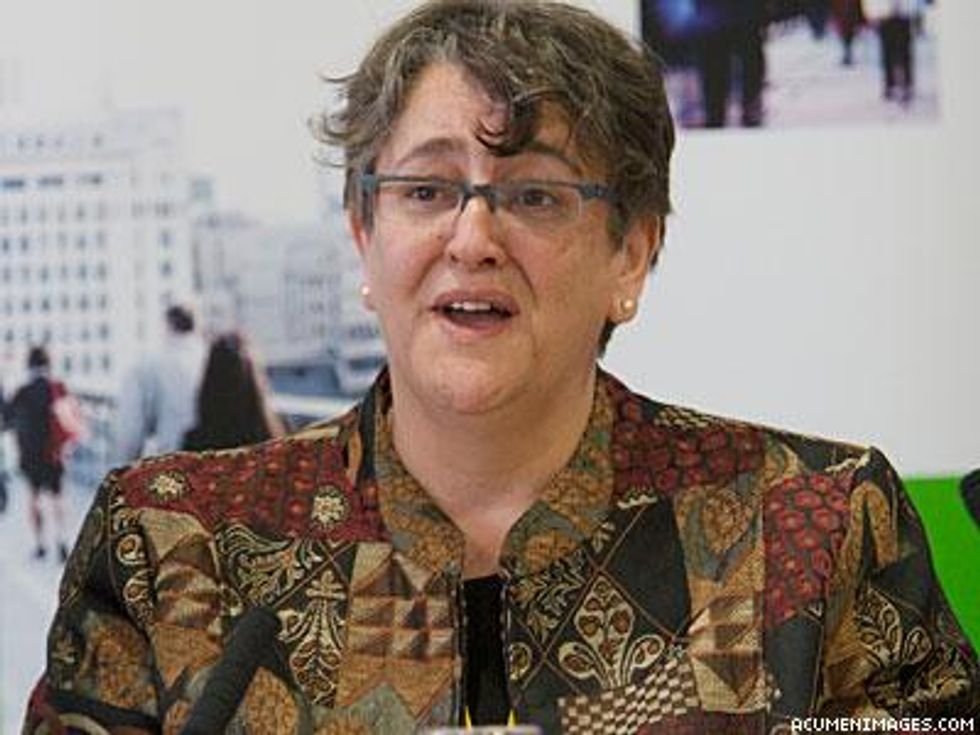Following two days of debate, England's House of Lords has voted to move forward marriage equality legislation by a vast majority of 390-148. The peers voted down a proposal from Lord Geoffrey Dear that would have killed the bill on this, its second reading, according to The Guardian.
Today's vote sends the pending legislation to a committee, after which it will be sent through the report stage, then returned to the House of Lords for third reading and final vote. If the bill passes each of those hurdles, it will be sent to the queen for her signature into law, also known as Royal Assent. Parliament's other chamber, the House of Commons, gave final approval to the legislation in May.
 During Monday's debate, Baroness Liz Barker (pictured, right) came out for the first time as being in a same-sex relationship. Opening the first day of debate by declaring a personal interest in the issue, Barker, a Liberal Democrat, said, "Many years ago, I had the great good fortune to meet someone. She and I have loved each other ever since -- that is, apart from the occasional spectacular argument, usually about driving or DIY."
During Monday's debate, Baroness Liz Barker (pictured, right) came out for the first time as being in a same-sex relationship. Opening the first day of debate by declaring a personal interest in the issue, Barker, a Liberal Democrat, said, "Many years ago, I had the great good fortune to meet someone. She and I have loved each other ever since -- that is, apart from the occasional spectacular argument, usually about driving or DIY."
It was the first time Barker had publicly acknowledged her sexual orientation, according to British LGBT site PinkNews. Barker went on to express gratitude for a letter from a bishop that acknowledged the meaning of marriage has evolved over the years, placing the debate in a larger historical context.
"What we are doing today does not undermine any existing or future marriage," said Barker. "It extends the status of marriage to gay men and lesbians who want to make a public commitment in the presence of their families and friends, and sometimes their co-religionists. It reflects the wishes of those people who today do not want just to tolerate lesbians and gay men; they want to celebrate and support them as people in their own right."
Other members of the parliamentary chamber adopted similarly progressive tones, citing the importance of marriage equality for families and rejecting homophobic arguments that claimed the Parliament was trying to invalidate or "redefine" existing heterosexual marriages. Lord Patrick Jenkin, a former minister, told the House that his grandfather, a renowned scientist, taught him early in life that condemning people due to their sexual orientation is "as foolish" as condemning someone for having red hair. Jenkin also succinctly dismissed several antigay arguments advanced by other peers, saying many of them "reek of homophobia," reports PinkNews.
Of course, not all peers were so eager to embrace marriage equality. Baroness Jill Knight, an 85-year-old Tory peer, put forth several stereotypes about gay people, saying they are "delightful" and "very artistic." But then Knight said that a "higher power" than any of the peers had "already decided that people are not equal," because some people are born bling, men can't bear a child, and women can't produce sperm. Knight also alleged that the bill would require schools to "teach homosexuality," despite strong "conscience clause"provisions included in the measure that would allow religious officials and institutions to decline to serve a gay or lesbian couple in conflict with their belief. Knight announced she would not support the bill, reports PinkNews.


 During Monday's debate, Baroness Liz Barker (pictured, right) came out for the first time as being in a same-sex relationship. Opening the first day of debate by declaring a personal interest in the issue, Barker, a Liberal Democrat, said, "Many years ago, I had the great good fortune to meet someone. She and I have loved each other ever since -- that is, apart from the occasional spectacular argument, usually about driving or DIY."
During Monday's debate, Baroness Liz Barker (pictured, right) came out for the first time as being in a same-sex relationship. Opening the first day of debate by declaring a personal interest in the issue, Barker, a Liberal Democrat, said, "Many years ago, I had the great good fortune to meet someone. She and I have loved each other ever since -- that is, apart from the occasional spectacular argument, usually about driving or DIY."


































































Charlie Kirk DID say stoning gay people was the 'perfect law' — and these other heinous quotes